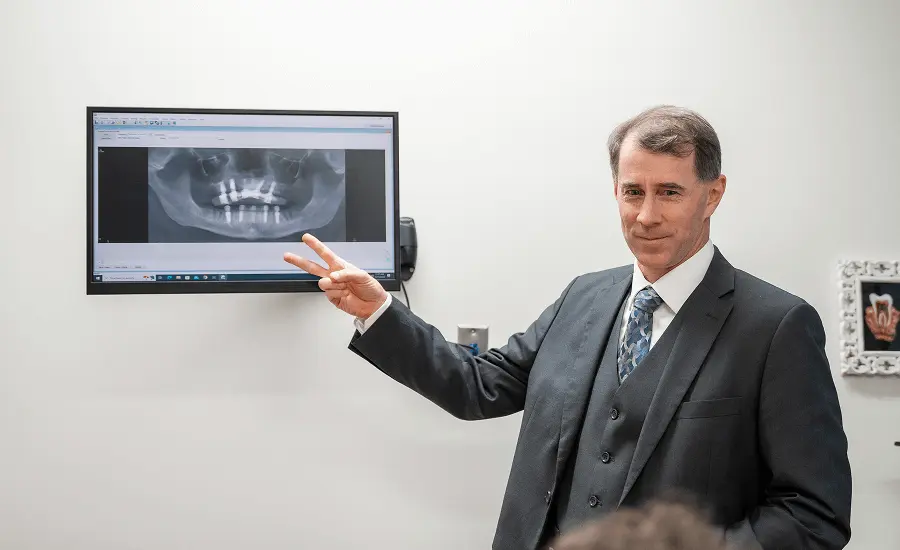
Many people have questions about their wisdom teeth, and understandably so. The wisdom teeth are a mysterious part of the anatomy to many. The “third molars” are the less vernacular name for the wisdom teeth.
Some people are the lucky ones and won’t need their wisdom teeth taken out by a dental professional. For the remaining 85% of the population who does, untreated wisdom teeth complications can lead to a whole slew of mouth problems down the line. So, it’s vitally important to see an oral surgeon with years of experience in removing wisdom teeth when it comes time. But first, let’s talk more about the teeth themselves.
What are Wisdom Teeth?
Wisdom teeth are the third and final set of molars to come into your mouth. While they begin to form in early childhood, around 7-10 years of age, they don’t typically erupt until the later teens or early 20s.
Way back when, wisdom teeth weren’t as much of a complication as they are today. Back when our diets consisted of tough, fibrous, unprocessed foods, our mouths were large enough to accommodate the four extra teeth. Once our diets changed to softer foods, our mouth size slowly followed suit and became too small to fit an extra set of teeth.
Once your wisdom teeth begin to erupt from the gumline, it’s time to heavily consider seeing a surgeon who excels at extracting third molars.
Why Do We Need Wisdom Teeth Removed?
When our jaws grow, they do not grow large enough for our wisdom teeth to come in – or, the wisdom teeth do come in before other teeth do, and hence overcrowd the mouth. Since our mouths lack the space for all of these teeth, our wisdom teeth often come in at an angle, or they do not fully emerge. Either way, this may cause issues for the rest of the mouth, and for the whole facial structure. Wisdom teeth removal is then required.
If wisdom tooth extraction doesn’t occur until well after they’ve erupted from the gums, patients can experience the following complications to their oral health as a result:
- Pain and discomfort – consistent pain around the back of the mouth is one of the first signs of wisdom teeth trying to erupt.
- Infection – when wisdom teeth come in at an angle, gum tissue can cover part of the tooth, creating the perfect environment for trapped food and bacteria to breed.
- Tooth decay – due to their position way back in the mouth, wisdom teeth are hard to clean even with a toothbrush and floss, leading to possible cavities.
- Crowding – our mouths don’t have enough space to accommodate an extra set of four teeth, so when wisdom teeth come in, they tend to push against and shift the position of neighboring teeth.
- Cysts and/or tumors – cysts are known to form around impacted wisdom teeth. As the cysts expand, they destroy surrounding teeth, bone, and nerves. Not fun.
- Gum disease – when teeth are hard to clean, they’re also susceptible to periodontitis and gingivitis.
If you suspect your wisdom teeth have begun to erupt and need pulled, don’t delay in visiting a nearby wisdom tooth removal surgeon. If we do not remove the wisdom teeth in time, these third molars can wreak havoc on their next-door neighbors in your mouth, the second molars. We always recommend removing the wisdom teeth before they can damage the second molars. The damage that could occur will often create a need for another, more involved surgery later on, so it is smarter to be pro-active about the situation.
Impacted Wisdom Teeth
When we say that the wisdom teeth are “impacted,” this means that the teeth have not fully erupted into the mouth because other teeth are blocking (impacting) them. Having those wisdom teeth stuck in the jaw, unable to erupt or emerge, is not a pleasant experience. This impacted state can cause pain, inflammation, and infection.
Why do our jaws not allow room for all 32 teeth to come in straight? This is an excellent question, and one with which our profession has grappled for many years. Our ancestors had all 32 come in, and their jaws developed to a greater extent than our do. Much of this is due to the modern diet, which includes a great deal of soft, nutrient-poor foods. Crunchy, raw foods used to constitute a much larger portion of our diet. We also used to receive nutrients from organ meats, which we largely miss with the modern diet. Liver and other organ meats contain Vitamin K2, which helps our bodies feed calcium into our bones.
In today’s society, we consume very little Vitamin K2, and this has led to our jaws developing less fully than they did thousands of years ago.
Symptoms of Impacted Wisdom Teeth
It’s entirely possible that impacted wisdom teeth will cause zero symptoms until multiple years later. When a wisdom tooth removal specialist doctor takes them out in a young patient, it’s done so from a preventative point of view.
For the rest of the population who does experience symptoms, the following are just a few of the signs that your wisdom teeth are becoming impacted:
- Persistent gum inflammation
- Difficulty opening your mouth
- Throbbing jaw pain
- Halitosis/bad breath
Thankfully, those who make regular visits to their dentist don’t have much to worry about. They take annual x-rays and imaging of your mouth’s structure, so problematic wisdom teeth are spotted early on before they can cause complications. Once spotted, your dentist will refer you to one of the exceptionally skilled wisdom teeth removal doctors in the area.
Dedicated Oral Surgeons Help Remove Wisdom Teeth
If you’re experiencing wisdom teeth difficulties and need a hand, specialist surgeons who extract wisdom teeth on the regular are your friends. Once you schedule a consultation and it’s confirmed that your third molars need to be pulled, your surgeon will get to work scheduling a date and preparing for surgery.
The surgery itself doesn’t take that long either. Depending on the number of teeth being removed and the intricacies of the particular case, most wisdom tooth removal surgeries only take around an hour or a little over. Your wisdom tooth extraction dentist will numb the surgical sites, and you’ll probably be given an IV sedative which puts you in a twilight sedation state where you’re incredibly relaxed. In fact, you probably won’t even remember the surgery when you fully come to.
Follow Your Surgeon’s Instructions on Aftercare for Wisdom Teeth Extraction
Once your surgery is complete, your dental doctor who pulled the wisdom teeth will send you home with post-operation care instructions. As you get back home, you’ll probably sleep a lot for the remainder of the day. Once the sedative fully wears off, study your aftercare instructions, because they’re crucial to follow.
Most of the instructions are relatively intuitive—keep up with your oral hygiene, only eat soft foods for the first week, abstain from smoking, etc.
The main complication that could follow the extraction of the third molars—like any other tooth extraction—is dry socket. Dry socket is a painful condition where the blood clot that naturally forms over the surgical site is damaged, exposing the wound, nerves and all. If you’re concerned that you’ve developed dry socket following a tooth extraction, don’t hesitate getting in touch with your oral surgeon’s office. The sooner it’s treated, the better.
If you have any questions about wisdom teeth removal, or would like to schedule an appointment, you can reach us at (937) 382-8020. The friendly staff at Wilmington Oral Surgery looks forward to working with you.







